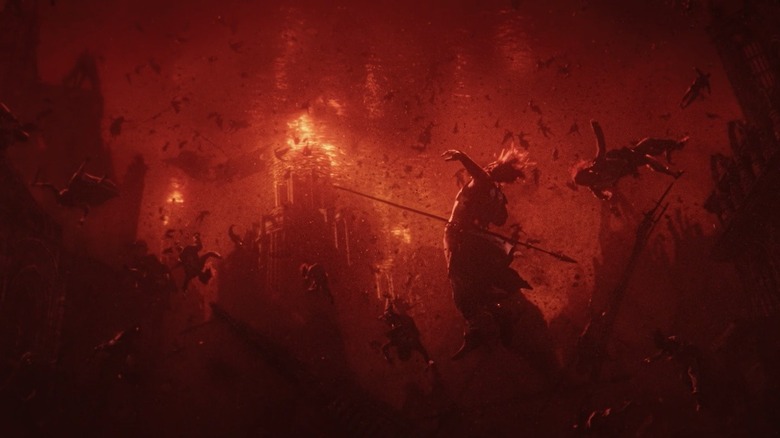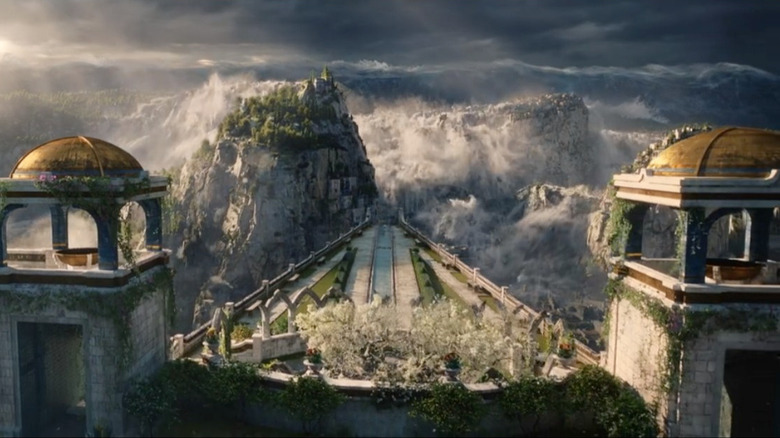One Arondir Line In The Rings Of Power Is A Callback To A Tragic Middle-Earth Event
Warning: This article contains some deep-cut spoilers about "The Rings of Power" season 2.
In episode 3 of "The Rings of Power" season 2, Arondir (Ismael Cruz Córdova) talks to Theo (Tyroe Muhafidin) after the death of Theo's mother, Bronwyn (Nazanin Boniadi). As he advises the young man to be careful of consuming anger, the Elf asks what Theo knows about Beleriand, explaining that it was an entire Elf realm and adding, "I was born there. Now it lies under the wave. After it fell, I felt such anger toward Morgoth, but I felt most anger towards myself."
The conversation moves on from there, leaving the fate of Beleriand unexplained.
Before we go any further, I just want to say that world-changing events in Middle-earth are a dime a dozen. In author J.R.R. Tolkien's lore, the world starts with the Valar (the angelic guardians of the world) entering it and shaping its seas and land masses. Eventually, they fight and break apart the original single continent into a few, one of which is Middle-earth.
While these early, mythological days of Middle-earth history are epic, the earth-altering events aren't reserved for ancient days. They continue to happen both before and after the point in the story that we're in during season 2, and the most recent world-shattering moment is the one Arondir is talking about.
"The Rings of Power" takes place in the Second Age of Middle-earth history. This follows the First Age (a brilliant deduction, I know), which ends with an event called the War of Wrath. This is a massive war between the Valar and Sauron's original master, Morgoth. The good guys win, but the supernatural power involved is so intense that it literally breaks a part of the world called Beleriand. This is Arondir's homeland, and it is a massive area that sticks off of the upper left corner of the Middle-earth map — at least, it used to.
The nearly complete obliteration of Beleriand in the War of Wrath
I could paint you a word picture of the intense destruction of the War of Wrath, but why bother when Tolkien did it for us? And not just once, but twice. In the book "The Silmarillion," the Oxford don explains that after the fighting ended:
"They looked upon a world that was changed. For so great was the fury of those adversaries that the northern regions of the western world were rent asunder, and the sea roared in through many chasms, and there was confusion and great noise; and rivers perished or found new paths, and the valleys were upheaved and the hills trod down; and Sirion was no more."
Later in that book, we get a similar description that reads:
"In the Great Battle and the tumults of the fall of Thangorodrim there were mighty convulsions in the earth, and Beleriand was broken and laid waste; and northward and westward many lands sank beneath the waters of the Great Sea."
This passage goes into more detail, adding that the destruction creates the land of Lindon (where the Elf High King Gil-galad rules and which is near the Shire later on). It is also in the aftermath of this event that the Valar raise an island out of the watery depths south of where Beleriand once stood — a famous island that goes by many names. Westernesse is one. Andor is another (and no, there's not a "Star Wars" connection). Elenna is yet another. But the most well-known name is Númenor. Yes, that Númenor.
Arondir's words are also a dark reminder for the Númenóreans
Arondir literally watched his homeland sink beneath the waves as a consequence of the wrath of the greater Middle-earth powers that be. Bringing that memory up centuries later also doubles as a warning to the proud Númenóreans, who are at their zenith during "The Rings of Power" story. What kind of warning are we talking about here? The civilization-saving kind.
Númenor's genesis comes from the fallout of the War of Wrath, when the Valar decide to reward the noble groups of Men who fought alongside them (called the Edain) with a safe and fruitful island set amidst the seas between Middle-earth and the Undying Lands. The primary condition of providing this new home is that they don't sail too far west toward those immortal lands. The reasons for this are complicated, but in essence, as mortal beings, they are naturally persona non grata in a region like that.
Unfortunately, when the throne of Númenor is usurped by Pharazôn (Trystan Gravelle) — and again, spoilers for some Middle-earth history that hasn't happened in "The Rings of Power" yet, but likely will — he ignores this ban and tries to attack the Undying Lands. This sparks the cataclysmic Atlantean sinking of his island into the ocean. (Told you there would be some big spoilers here!)
It's also worth pointing out that, in season 2, Arondir crosses paths with Isildur (Maxim Baldry). Isildur eventually becomes one of the key leaders of The Faithful, who resist Pharazôn and flee the island while it is destroyed. Perhaps Arondir's advice will eventually help him prepare for the future, too. Even in the minor moments, showrunners Patrick McKay and JD Payne's multi-season Middle-earth epic is slowly building to some of its most dramatic, and tragic moments. Some of these will show up this season, but the sinking of Númenor is almost certainly something we won't see for another season or two at this point. Patience is a virtue!


